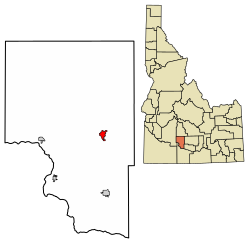Gooding, Idaho | |
|---|---|
 An aerial view of Gooding, Idaho, from the South. The road in the middle of the photo is Highway 46. | |
 Location of Gooding in Gooding County, Idaho. | |
| Coordinates: 42°56′14″N114°42′48″W / 42.93722°N 114.71333°W | |
| Country | United States |
| State | Idaho |
| County | Gooding |
| Established | 1907 |
| Incorporated | 1908 |
| Area | |
• Total | 1.53 sq mi (3.96 km2) |
| • Land | 1.52 sq mi (3.93 km2) |
| • Water | 0.012 sq mi (0.03 km2) |
| Elevation | 3,570 ft (1,090 m) |
| Population | |
• Total | 3,567 |
| • Density | 2,270/sq mi (876.5/km2) |
| Time zone | UTC-7 (Mountain) |
| • Summer (DST) | UTC-6 (Mountain) |
| ZIP code | 83330 |
| Area code | 208 |
| FIPS code | 16-32140 |
| GNIS feature ID | 2410619 [2] |
| Website | www |
Gooding is the county seat of and the largest city in Gooding County, Idaho, United States. [4] The population was 3,716 at the 2020 census.
Contents
- Notable people
- Demographics
- 2010 census
- 2000 census
- Geography
- Climate
- Government and infrastructure
- Education
- Gooding Joint School District
- North Valley Academy
- Idaho School for the Deaf and the Blind
- Gooding College
- See also
- References
- External links
The city is named for Frank R. Gooding, a local sheep rancher who became a prominent political figure in Idaho in the early 20th century, serving as both Governor of Idaho and a United States Senator. The original name of Gooding was Toponis.
Gooding is home to the Idaho School for the Deaf and the Blind.
The world's largest factory for barrel cheese, the raw product for processed cheese, is located in Gooding. It has a capacity of 120,000 metric tons per year of barrel cheese and belongs to the Glanbia group. [5] Gooding is also home to Gooding Elementary, Gooding Middle, and Gooding High schools.




